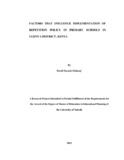| dc.description.abstract | This study mainly focused on determining the factors that have had major influence on the implementation of class repetition policy that was intended to put a stop on forced class repetition in all schools in Kenya. The study, carried out in Ugenya District ofSiaya County, had four objectives. The objectives were: to determine how pupil teacher ratio had affected the implementation of class repetition policy; to determine the influaence of family income level on the implementation of the policy; to determine the influence of physical facilities on the implementation of the policy; and to identify policy interventions that should be put in place to help mitigate the problem of non-compliance with the policy by the school managements.
The study was guided by the human capital theory as was proposed by Theodore Shultz in his book 'The Economic Value of Education'. This theory emphasized that most of the economic value of people are enhanced as they continue to involve in the process of schooling. The involvement in schooling enables them to acquire knowledge, skills, attributes and competencies, and other attributes that enhance productive capabilities in human being.
The study adopted descriptive survey research. This is a self report study that requires the collection of quantifiable information from a sample by interviewing and administering questionnaires to a sample of individual (Kothari 2006). Data collection in the study was done by use of self administered questionnaires and document analysis guides. The data collected included those that gave direct answers to research questions and those that gave highlights on the background information on class repetition in the district data that provided highlights on class repetition included: prevalence of class repetition; manners of class or form of class repetition, whether voluntary or forced; and rate of class repetition.
After the collected data had been analyzed, the result indicated that the directive, through the policy, to stop forced class repetition was not complied with in all schools that participated in the study. The non- compliance was mainly due to the factors which affected the delivery of adequate and effective learning in schools, especially to the struggling learners and those from poor households. These factors iricluded; physical facilities available in schools; pupil teacher ratio in schools; pupil teacher ratio in schools; and levels of pupils' family level of income.
Based on the findings of the study the following recommendations were made: that the government should carry out a nationwide study to ascertain the extent of implementation ofthe policy; that there should be afresh redistribution of teachers to schools based on the consideration of the number of pupils in a school; that the government should put in place policy interventions to enhance the implementation of the policy; that the government should take over, from parents, the responsibility of providing basic physical facilities such as classrooms and desks; and that it should be mandatory for all schools to have lunch programmes. The implementations of these suggestions would in tum, according to the researcher, enable the successful implementation of the class repetition policy. | en_US |

